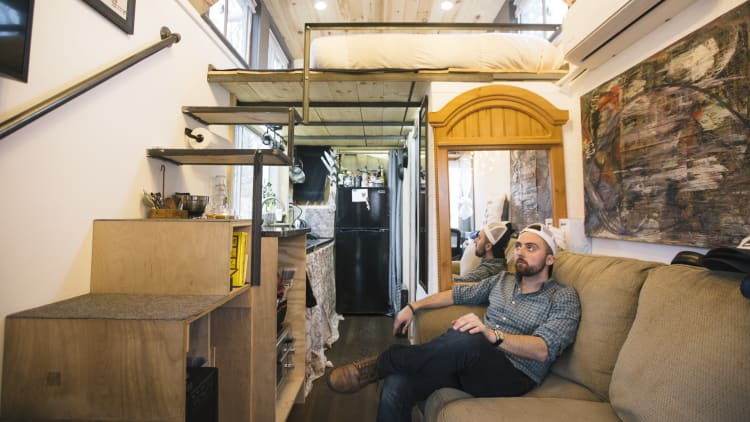Demand for tiny homes has been sweeping the nation, spurred in part by the high cost of owning and the desire to live simpler, with less.
In Detroit, the fad is serving a different purpose: An opportunity for low-income residents to become homeowners, reports Jeffrey Brown of PBS NewsHour.
Led by Cass Community Social Services, the local project is one of many efforts to help rebuild the metro area after it became the largest U.S. city to file for bankruptcy in 2013. The non-profit bought 25 vacant lots from the city for $15,000, total, and intends to spend $40,000 to $50,000 building a tiny home on each, with the help of a volunteer workforce.
The homes will range from 250-square-feet to 400-square-feet. But the cramped quarters don't appear to be a turn off. Hundreds of low-income earners have already applied to live in the seven tiny homes that are fully built.

Residents will rent to own, Brown reports: "They'll pay a dollar per square foot in rent. They're also required to take monthly financial literacy classes and volunteer for the neighborhood watch. After seven years, they'll own their homes."
The idea is to lower the barrier to homeownership, Faith Fowler, the executive director of Cass Community, tells Brown. "We were really looking for a way to give them a ladder. I mean, they've got to climb it, they've got to do the work, but we're providing the ladder."
While Cass Community's Tiny Homes Project is aiming to help homeless and low-income people specifically, living small may be a good option for anyone who wants to cut costs. For 26-year-old Alicia Kathleen Mathias, attaching a tiny home to her truck allowed her to pay off student debt and travel.
That said, the No. 1 regret of even those buying a full-sized house is that they wish they had more space.
Still, given the many constraints millennials face, including high prices and low inventory, a tiny home might be a way, or the only way, for them to get into the market.
As for the Detroit project, "it's really about home ownership and the American dream for people who stopped dreaming," says Fowler.
Like this story? Like CNBC Make It on Facebook.
Don't miss: 3 signs you aren't ready to buy a home



